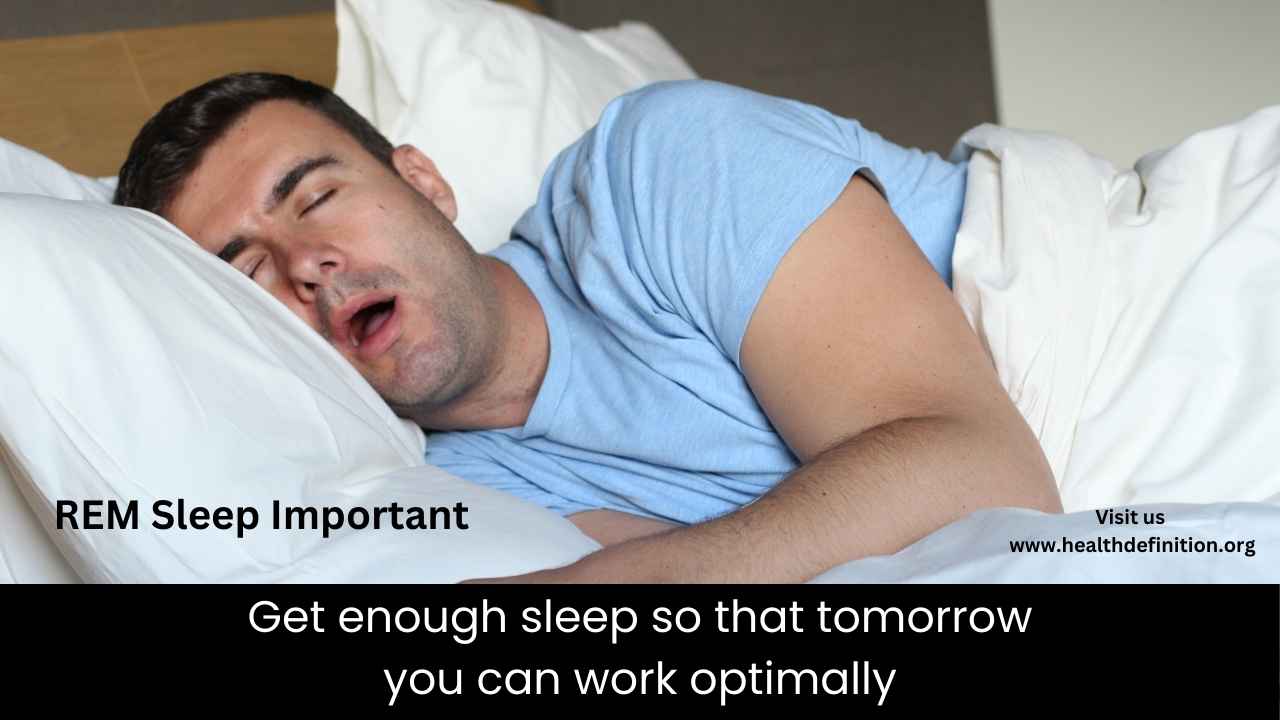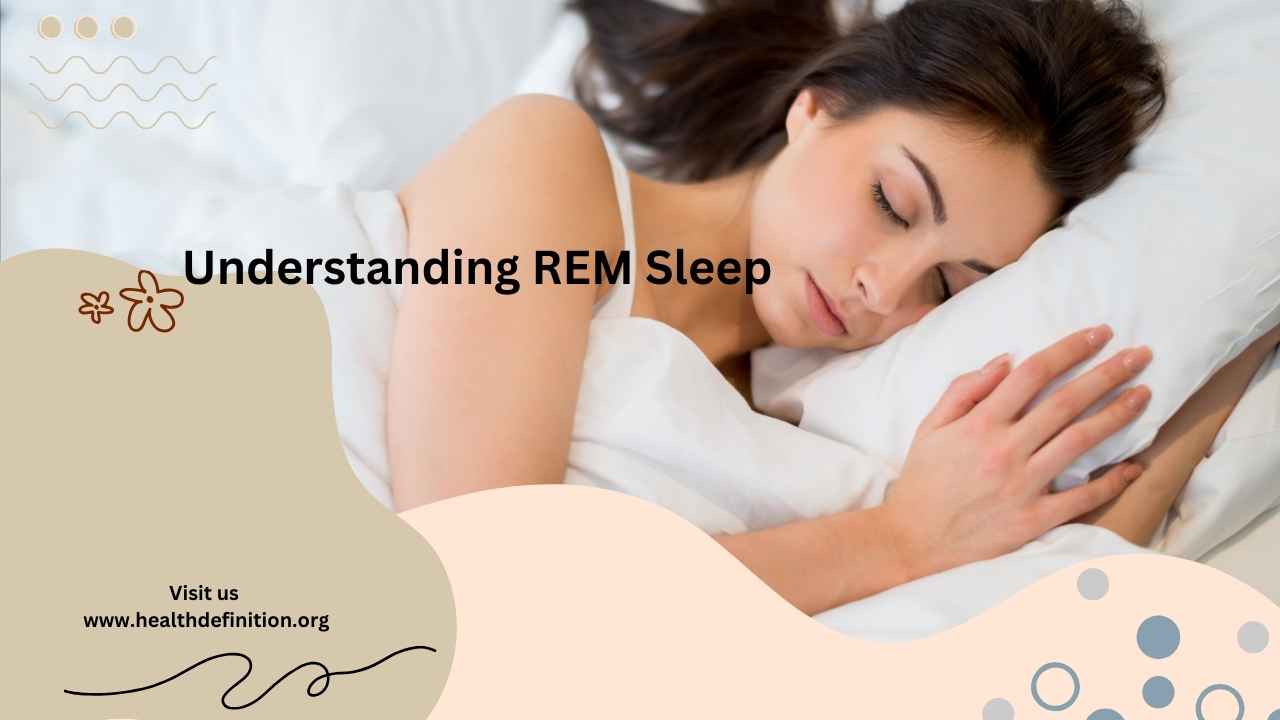
REM Sleep Important: Sleep is essential for overall well-being, and among its various stages, Rapid Eye Movement (REM) sleep plays a crucial role in maintaining cognitive function, emotional balance, and physical health. REM sleep is characterized by vivid dreaming, heightened brain activity, and rapid movement of the eyes. It is a vital component of the sleep cycle that significantly contributes to memory consolidation, emotional regulation, and brain development. This article explores the importance of REM sleep, its functions, and the consequences of its deprivation.
Understanding REM Sleep
The sleep cycle consists of four main stages, categorized into non-rapid eye movement (NREM) and rapid eye movement (REM) sleep. A typical sleep cycle lasts about 90 minutes and repeats multiple times throughout the night. REM sleep typically begins about 90 minutes after falling asleep and increases in duration as the night progresses.
During REM sleep, brain activity increases to levels similar to those during wakefulness. The body, however, experiences temporary paralysis (atonia), preventing physical responses to dreams. This stage is essential for cognitive processes, emotional stability, and physiological repair.
The Importance of REM Sleep
Memory Consolidation and Learning
One of the most significant functions of REM sleep is its role in memory consolidation. Studies suggest that REM sleep enhances procedural and declarative memory, helping individuals retain new information and improve problem-solving skills. It is particularly beneficial for learning complex tasks and developing creativity.
Emotional Regulation
REM sleep is essential for processing emotions and managing stress. The brain processes emotional experiences during REM sleep, allowing individuals to cope with daily stressors effectively. Lack of REM sleep can lead to increased emotional reactivity, irritability, and difficulty in handling stressful situations.
Brain Development
REM sleep important, for infants and children, REM sleep is crucial for brain development. Newborns spend a significant portion of their sleep in the REM stage, supporting neural connections, synaptic growth, and cognitive development. Adequate REM sleep is vital for cognitive and behavioral growth in early life.
Mental Health Benefits
REM sleep important, sufficient REM sleep is linked to better mental health outcomes. Disruptions in REM sleep are associated with conditions such as depression, anxiety, and mood disorders. People suffering from chronic sleep deprivation often experience heightened risks of psychiatric conditions, as REM sleep plays a role in stabilizing mood and reducing stress.
Creativity and Problem-Solving
REM sleep important, researchers have found that REM sleep is integral to creativity and problem-solving. The brain reorganizes information and strengthens neural connections during this stage, allowing for innovative thinking and improved cognitive flexibility. Many great inventors, artists, and writers have credited deep sleep, particularly REM sleep, for their creative insights.
Physical Health Benefits
REM sleep important, while REM sleep is mainly associated with brain function, it also impacts physical health. Studies indicate that adequate REM sleep supports immune function, hormonal balance, and metabolism. It also plays a role in cardiovascular health by regulating blood pressure and reducing the risk of heart disease.

Which is better, REM or deep sleep?
Both REM sleep and deep sleep (slow-wave sleep) are crucial, but they serve different purposes. Neither is “better”, as they work together to maintain overall health.
Key Differences Between REM and Deep Sleep:
| Feature | REM Sleep | Deep Sleep (Slow-Wave Sleep) |
|---|---|---|
| Purpose | Memory, learning, emotional processing | Physical recovery, immune function, hormone release |
| Brain Activity | High (like wakefulness) | Slow, synchronized brain waves |
| Body State | Muscles paralyzed, vivid dreams | Muscles relaxed, little dreaming |
| When It Occurs | More in later sleep cycles (morning) | More in early sleep cycles (first half of night) |
| Benefits | Cognitive function, creativity, mood regulation | Muscle and tissue repair, energy restoration |
Which One Is More Important?
- If you lack REM sleep, you may struggle with memory, learning, and emotional regulation.
- If you lack deep sleep, you may experience fatigue, muscle soreness, and a weakened immune system.
Balance is key! You need both for optimal health, energy, and brain function.
Consequences of REM Sleep Deprivation
Insufficient REM sleep can have detrimental effects on physical and mental health. Some common consequences include:
- Cognitive Impairment: Poor REM sleep can lead to memory issues, difficulty concentrating, and reduced problem-solving abilities.
- Mood Disorders: A lack of REM sleep can contribute to depression, anxiety, and heightened emotional reactivity.
- Weakened Immune System: Sleep deprivation weakens the immune system, making individuals more susceptible to infections and illnesses.
- Increased Risk of Chronic Conditions: Prolonged REM sleep deprivation has been linked to cardiovascular diseases, obesity, and metabolic disorders.
- Reduced Coping Mechanisms: Individuals deprived of REM sleep struggle to process emotions and stress effectively, leading to increased irritability and poor decision-making.
How to Improve REM Sleep
To ensure sufficient REM sleep, consider the following sleep hygiene tips:
- Maintain a Consistent Sleep Schedule: Going to bed and waking up at the same time daily helps regulate the sleep cycle.
- Create a Relaxing Bedtime Routine: Engaging in calming activities before bed, such as reading or meditation, can promote better sleep.
- Limit Caffeine and Alcohol: Both substances can disrupt sleep quality and reduce REM sleep.
- Ensure a Comfortable Sleep Environment: A dark, quiet, and cool bedroom can promote restful sleep.
- Avoid Electronic Screens Before Bedtime: Blue light from devices can interfere with melatonin production and disrupt sleep patterns.
- Exercise Regularly: Physical activity can improve sleep quality, but avoid strenuous workouts close to bedtime.
What happens if you don’t get REM sleep?
If you don’t get enough REM (Rapid Eye Movement) sleep, it can have several negative effects on both your mind and body. REM sleep is essential for cognitive function, emotional regulation, and overall well-being. Here’s what can happen if you miss out on it:
Short-Term Effects:
- Memory and Learning Issues – REM sleep is crucial for consolidating memories and learning new information. Without it, you may struggle with recall and problem-solving.
- Emotional Instability – You might feel more irritable, anxious, or depressed because REM sleep helps regulate emotions.
- Increased Stress Levels – Lack of REM sleep can make it harder to cope with stress, leading to heightened anxiety.
- Poor Concentration and Creativity – Your ability to focus, process information, and think creatively can suffer.
- Fatigue and Drowsiness – Even if you get enough total sleep, missing REM can leave you feeling unrested.
Long-Term Effects:
- Higher Risk of Mental Health Disorders – Chronic REM sleep deprivation has been linked to depression, anxiety, and even psychosis in extreme cases.
- Weakened Immune System – Poor REM sleep can make you more susceptible to illnesses.
- Increased Risk of Neurodegenerative Diseases – Some studies suggest a connection between REM sleep deprivation and conditions like Alzheimer’s and Parkinson’s.
- Weight Gain and Metabolic Issues – REM sleep affects appetite regulation, and missing it can lead to overeating and metabolic disturbances.
- Cardiovascular Problems – Poor REM sleep is associated with high blood pressure and an increased risk of heart disease.
Causes of REM Sleep Deprivation:
- Alcohol or caffeine consumption before bed
- Sleep disorders like insomnia or sleep apnea
- Chronic stress or anxiety
- Irregular sleep schedules
How to Improve REM Sleep:
- Stick to a consistent sleep schedule
- Avoid alcohol, caffeine, and screens before bed
- Manage stress with relaxation techniques
- Create a comfortable sleep environment
Missing REM sleep occasionally won’t have drastic effects, but chronic deprivation can significantly impact your health.
Most adults need 1.5 to 2 hours of REM sleep per night, which is about 20–25% of total sleep time. Since a full night’s sleep is typically 7–9 hours, this means you should aim for four to five REM cycles throughout the night.
REM Sleep Needs by Age:
- Newborns (0-3 months) – 50% of sleep is REM (~8 hours)
- Children (4-12 years) – 25-30% of sleep is REM (~2-3 hours)
- Teens (13-18 years) – 20-25% of sleep is REM (~1.5-2.5 hours)
- Adults (18-64 years) – 20-25% of sleep is REM (~1.5-2 hours)
- Older Adults (65+ years) – REM sleep percentage may slightly decrease
What If You Don’t Get Enough REM Sleep?
Consistently missing out on REM sleep can lead to memory issues, mood disturbances, weakened immunity, and increased risk of neurodegenerative diseases like Alzheimer’s.
Conclusion
REM sleep is a fundamental component of a healthy sleep cycle, playing a vital role in memory, emotional regulation, creativity, and overall well-being. Understanding its importance and taking steps to improve sleep quality can lead to better cognitive function, mental health, and physical well-being. By prioritizing REM sleep, individuals can enhance their quality of life and ensure long-term health benefits.

FAQs about “why is rem sleep important”
. Why is REM sleep important for the brain?
- REM sleep plays a key role in memory consolidation, learning, and problem-solving. It helps process emotions, strengthen neural connections, and clear out unnecessary information, making it essential for cognitive function.
How does REM sleep affect mental health?
- REM sleep helps regulate emotions and stress. A lack of REM sleep is linked to mood disorders like depression and anxiety, as well as increased irritability and difficulty coping with stress.
What happens if you don’t get enough REM sleep?
- Short-term effects include memory issues, difficulty concentrating, and emotional instability. Long-term deprivation can lead to an increased risk of mental health disorders, weakened immune function, and even neurodegenerative diseases like Alzheimer’s.
How much REM sleep do you need?
- Most adults need 1.5 to 2 hours of REM sleep per night, which is about 20-25% of total sleep time. This typically happens in four to five REM cycles throughout the night.
How can you improve REM sleep?
- Maintain a consistent sleep schedule
- Avoid alcohol, caffeine, and screens before bed
- Reduce stress through relaxation techniques
- Ensure a comfortable sleep environment
- Exercise regularly but not too close to bedtime
Bullet points about “why is rem sleep important”
-
Enhances Memory & Learning – REM sleep important for helps consolidate memories, process new information, and improve problem-solving skills.
-
Regulates Emotions & Mental Health – It plays a key role in emotional stability, reducing stress, anxiety, and the risk of depression.
-
⚡ Boosts Creativity & Cognitive Function – REM sleep important for enhances creative thinking, decision-making, and overall brain performance.
-
Supports Physical Health & Recovery – It aids in muscle repair, immune system function, and overall body restoration.
-
Prevents Sleep Disorders & Fatigue – Proper REM sleep important for keeps you feeling refreshed, reducing daytime drowsiness and brain fog.
-
❤️ Promotes Heart & Metabolic Health – REM sleep important for helps regulate blood pressure, metabolism, and appetite, reducing the risk of obesity and heart disease.

